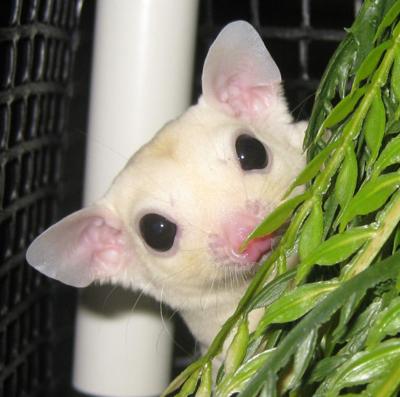Have you ever wished you could have your very own pet marsupial? Unfortunately, it isn’t legal to keep kangaroos as pets, Tasmanian devils are mean, wombats are ugly, and most people just don’t want a pet opossum. So what is a would-be marsupial owner to do? Get a sugar glider!
Dr. James Morrisey, a vet specializing in exotics at the Cornell University Hospital for Animals said, “An important thing to keep in mind is that they’re marsupials. They’re called sugar gliders because they glide huge distances. They’re arboreal. One of the big misconceptions is that they eat fruit, which they love but that is not an appropriate diet for them.”
Morrisey explained that, in fact, sugar gliders are insectivorous and nectivorous, meaning that they eat insects and tree sap. In the wild, they use their nails to gouge into eucalyptus trees and eat the sap and manna inside, which is high in protein and fat. In captivity, there are commercially available glider foods as well as recipes for making your own glider food mixes. On occasion, Morrisey said, they even eat meat, such as live baby mice.
Sugar gliders aren’t particularly expensive pets, although it can be hard to find a breeder who sells them. They cost between $150 and $250 and there are no required vaccines. Despite the relative difficulty in finding them, Morrisey said, “They seem to be increasing in popularity. We are definitely seeing them more frequently and people are also taking better care of them so they are living longer.”
In case you’re considering buying a glider from a breeder you don’t know, Morrisey explained some of things to look for to make sure you’re getting a healthy and well-adjusted animal: “You should make sure it’s weaned. If it’s a male, you could ideally buy it after it’s castrated.” If they are not castrated, male gliders can have a very strong odor. Female gliders are not spayed because the process is surgically difficult. Morrisey added, “Make sure it’s on a good diet and that the owners are familiar with raising gliders.” As with most animals, you want to pick one that is bright-eyed and active, although gliders are nocturnal – hence the adorably large eyes – so they are generally not active during the day.
An important thing to understand before investing in a glider is that they are highly social. Morrisey said, “They are social animals and so they need to be kept in groups.” Cornell vet student Loren Rodriguez, who has two gliders, agrees that they are social animals, although she got her gliders – Ladybug and Cricket – six months apart so that she could have some time to bond with one before getting another.
Rodriguez said the most difficult part of owning a glider is the long bonding process. She said, “It takes a lot of work to tame them. I think a lot of people get them because they’re really cute, but they’re a lot of work in the beginning.”
Rodriguez explained the steps she took to bond with her gliders: “I started with having them in a pouch that I carried around on my person. It’s called crabbing when they make their angry noise and when you pet the pouch they stop making that noise. And then I’d reach into the pouch with a grape or a mealworm. Then you play with them in the pouch and then eventually you can take them out. If you don’t do that then they’re terrible pets – they’re going to bite you. If you disturb them they make a terrible noise.” It is indeed a terrible noise; their bark sounds like a dog’s squeaky toy and their crabbing noise sounds like a broken toy car motor.
Once they bond with you, though, Rodriguez said they make wonderful pets: “They’re cute and they really do form a special bond with a person. Having owned a lot of exotics, I feel like my relationship with my gliders is more like with a cat. They’re excited to see you when you get home.”









(1) comment
Thinking about getting a sugar glider...what is the life expectancy...would like to know if you have any major concerns...thank you!
Welcome to the discussion.
Log In
This is a space for civil feedback and conversation. A few guidelines: 1. be kind and courteous. 2. no hate speech or bullying. 3. no promotions or spam. If necessary, we will ban members who do not abide by these standards.